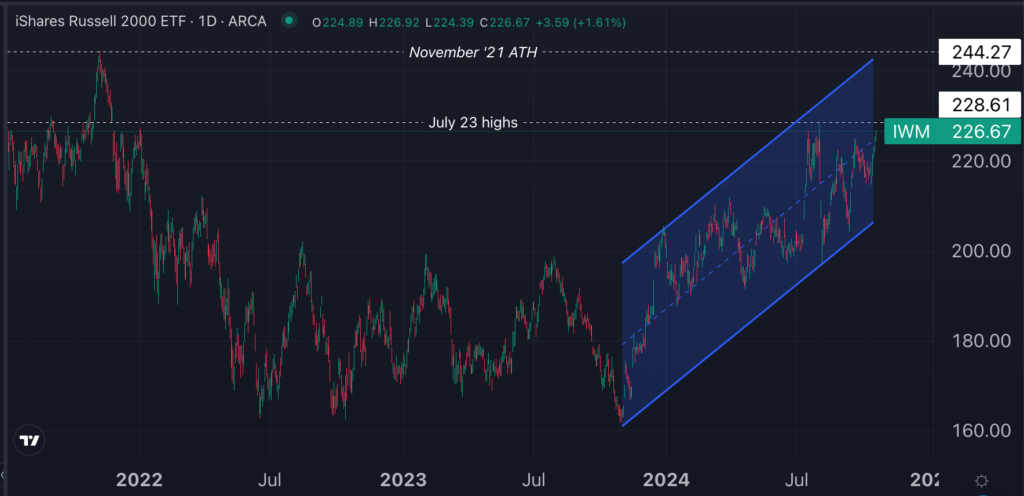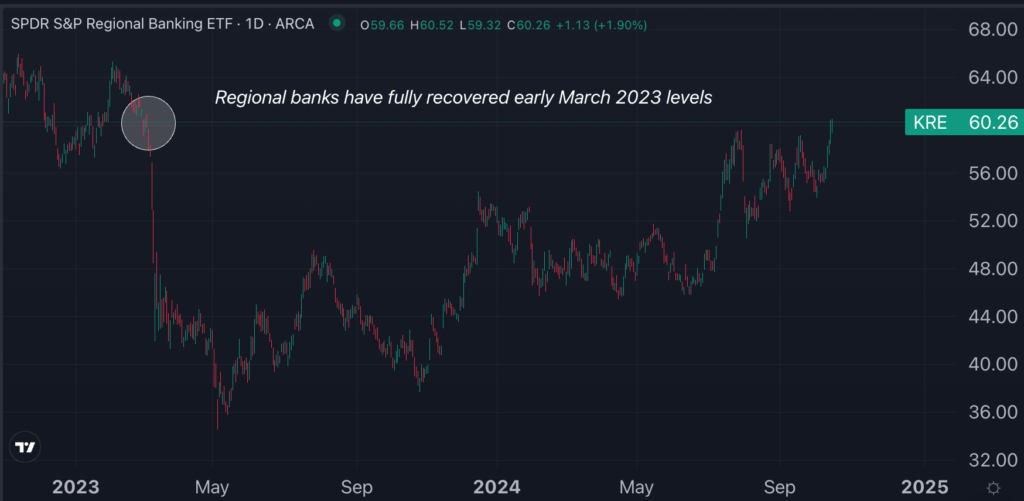Russell 2000 Poised For Major Technical Breakout: Analyst Eyes 'A Trend Reversal In Favor Of Small Caps Outperforming' S&P 500
The Russell 2000 Index, a benchmark for small-cap stocks, is on the verge of a significant technical breakout that could push it to levels not seen since late November 2021.
On Wednesday, the index is testing a crucial resistance zone around the 2,300-point level, a ceiling last reached on July 31.
While the S&P 500, Dow Jones and Nasdaq 100 have set fresh all-time highs in 2024, the Russell 2000, as tracked by the iShares Russell 2000 ETF (NYSE:IWM), still remains 6.7% below its peak.
Market participants are now closely watching whether small-cap stocks can rally to catch up large-cap counterparts on the back of economic growth resilience and lower interest rates.

Strong Economy, Lower Interest Rates Could Propel Small Caps
“Small caps have been stuck in a consolidation range over the last few months as investors questioned the likelihood of a soft-landing scenario and the path of monetary policy. Small caps tend to be more sensitive to economic conditions and interest rates versus their larger cap peers,” commented Adam Turnquist, chief technical strategist at LPL Financial.
The outlook for small caps has brightened amid strong economic data and optimism surrounding Federal Reserve policy.
The U.S. economy continues to show resilience, with the Atlanta Fed GDPNow model forecasting 3.2% GDP growth for the fourth quarter of 2024, marking an acceleration from 3% growth in the third quarter.
Additionally, the U.S. labor market has recently outperformed even the rosiest expectations, with 254,000 jobs added in September, marking the strongest monthly job growth in six months. This was a substantial increase from the 159,000 jobs added in August, far surpassing forecasts of 140,000. The unemployment rate fell to 4.1%, while wage growth also accelerated.
Turnquist highlighted, “With the growth outlook recently improving — underpinned by better-than-feared labor market conditions — and increased visibility into Fed rate cuts, the Russell 2000 has rallied off the lower end of its rising price channel.
Bank Stocks Bolster Small-Cap Performance
The banking sector has been a key driver behind the recent surge in small-cap stocks, fueled by solid earnings from major financial heavyweights.
Leading U.S. banks — including JPMorgan Chase & Co. (NYSE:JPM), Goldman Sachs Group Inc. (NYSE:GS), Bank of America Corp. (NYSE:BAC), Citigroup Inc. (NYSE:C), Wells Fargo & Co. (NYSE:WFC), Bank of New York Mellon Corp. (NYSE:BK), and Charles Schwab Corp. (NYSE:SCHW) — all reported better-than-expected thrid-quarter earnings, sparking investor optimism in the broader financial sector.
The bullish momentum on large banks has had a ripple effect on regional banks, which make up the largest sector of the Russell 2000.
The SPDR S&P Regional Banking ETF (NYSE:KRE) extended its rally to six consecutive days, fully rebounding from the banking crisis triggered in March 2023 by the collapse of Silicon Valley Bank and Signature Bank.

Russell 2000: Technical Outlook
“Technically, a close above 2,275 would confirm a breakout from its current symmetrical triangle and leave the 2021 highs as the next resistance hurdle to clear. Momentum indicators have also recently turned bullish, adding to the evidence of a topside breakout,” Turnquist explained.
However, it’s important to note that despite recent improvements, the Russell 2000’s relative performance against the S&P 500 — tracked by the IWM/SPDR S&P 500 ETF (NYSE:SPY) ratio — remains in a downtrend.
The ratio is still below its declining 200-day moving average, signaling that small caps have yet to fully outperform their large-cap counterparts.
“A close above the July highs would validate a trend reversal in favor of small caps outperforming,” Turnquist added.
Read Now:
Photo: IConcept via Shutterstock
 Index Options
Index Options CME Group
CME Group Nasdaq
Nasdaq Cboe
Cboe TradingView
TradingView Wall Street Journal
Wall Street Journal